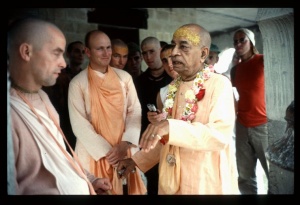SB 9.10.18: Difference between revisions
m (1 revision(s)) |
(Vanibot #0054 edit - transform synonyms into clickable links, which search similar occurrences) |
||
| (One intermediate revision by one other user not shown) | |||
| Line 1: | Line 1: | ||
{{info | {{info | ||
|speaker= | |speaker=Śukadeva Gosvāmī | ||
|listener=King | |listener=King Parīkṣit | ||
}} | }} | ||
[[Category:Srimad-Bhagavatam - Canto 09 Chapter 10]] | |||
[[Category:Bhagavatam Verses Spoken by Sukadeva Gosvami - Vanisource|091018]] | |||
<div style="float:left">'''[[Srimad-Bhagavatam]] - [[SB 9|Ninth Canto]] - [[SB 9.10: The Pastimes of the Supreme Lord, Ramacandra|Chapter 10: The Pastimes of the Supreme Lord, Rāmacandra]]'''</div> | |||
<div style="float:right">[[File:Go-previous.png|link=SB 9.10.17]] '''[[SB 9.10.17]] - [[SB 9.10.19]]''' [[File:Go-next.png|link=SB 9.10.19]]</div> | |||
{{RandomImage}} | |||
==== TEXT 18 ==== | ==== TEXT 18 ==== | ||
<div | <div class="verse"> | ||
rakṣaḥ-patis tad avalokya nikumbha-kumbha- | :rakṣaḥ-patis tad avalokya nikumbha-kumbha- | ||
dhūmrākṣa-durmukha-surāntaka-narāntakādīn | :dhūmrākṣa-durmukha-surāntaka-narāntakādīn | ||
putraṁ prahastam atikāya-vikampanādīn | :putraṁ prahastam atikāya-vikampanādīn | ||
sarvānugān samahinod atha kumbhakarṇam | :sarvānugān samahinod atha kumbhakarṇam | ||
</div> | </div> | ||
| Line 17: | Line 22: | ||
==== SYNONYMS ==== | ==== SYNONYMS ==== | ||
<div | <div class="synonyms"> | ||
rakṣaḥ- | ''[//vanipedia.org/wiki/Special:VaniSearch?s=rakṣaḥ&tab=syno_o&ds=1 rakṣaḥ]-[//vanipedia.org/wiki/Special:VaniSearch?s=patiḥ&tab=syno_o&ds=1 patiḥ]'' — the master of the Rākṣasas (Rāvaṇa); ''[//vanipedia.org/wiki/Special:VaniSearch?s=tat&tab=syno_o&ds=1 tat]'' — such disturbances; ''[//vanipedia.org/wiki/Special:VaniSearch?s=avalokya&tab=syno_o&ds=1 avalokya]'' — after seeing; ''[//vanipedia.org/wiki/Special:VaniSearch?s=nikumbha&tab=syno_o&ds=1 nikumbha]'' — Nikumbha; ''[//vanipedia.org/wiki/Special:VaniSearch?s=kumbha&tab=syno_o&ds=1 kumbha]'' — Kumbha; ''[//vanipedia.org/wiki/Special:VaniSearch?s=dhūmrākṣa&tab=syno_o&ds=1 dhūmrākṣa]'' — Dhūmrākṣa; ''[//vanipedia.org/wiki/Special:VaniSearch?s=durmukha&tab=syno_o&ds=1 durmukha]'' — Durmukha; ''[//vanipedia.org/wiki/Special:VaniSearch?s=surāntaka&tab=syno_o&ds=1 surāntaka]'' — Surāntaka; ''[//vanipedia.org/wiki/Special:VaniSearch?s=narāntaka&tab=syno_o&ds=1 narāntaka]'' — Narāntaka; ''[//vanipedia.org/wiki/Special:VaniSearch?s=ādīn&tab=syno_o&ds=1 ādīn]'' — all of them together; ''[//vanipedia.org/wiki/Special:VaniSearch?s=putram&tab=syno_o&ds=1 putram]'' — his son, Indrajit; ''[//vanipedia.org/wiki/Special:VaniSearch?s=prahastam&tab=syno_o&ds=1 prahastam]'' — Prahasta; ''[//vanipedia.org/wiki/Special:VaniSearch?s=atikāya&tab=syno_o&ds=1 atikāya]'' — Atikāya; ''[//vanipedia.org/wiki/Special:VaniSearch?s=vikampana&tab=syno_o&ds=1 vikampana]'' — Vikampana; ''[//vanipedia.org/wiki/Special:VaniSearch?s=ādīn&tab=syno_o&ds=1 ādīn]'' — all of them together; ''[//vanipedia.org/wiki/Special:VaniSearch?s=sarva&tab=syno_o&ds=1 sarva]-[//vanipedia.org/wiki/Special:VaniSearch?s=anugān&tab=syno_o&ds=1 anugān]'' — all followers of Rāvaṇa; ''[//vanipedia.org/wiki/Special:VaniSearch?s=samahinot&tab=syno_o&ds=1 samahinot]'' — ordered (to fight with the enemies); ''[//vanipedia.org/wiki/Special:VaniSearch?s=atha&tab=syno_o&ds=1 atha]'' — at last; ''[//vanipedia.org/wiki/Special:VaniSearch?s=kumbhakarṇam&tab=syno_o&ds=1 kumbhakarṇam]'' — Kumbhakarṇa, the most important brother. | ||
</div> | </div> | ||
| Line 24: | Line 29: | ||
==== TRANSLATION ==== | ==== TRANSLATION ==== | ||
<div | <div class="translation"> | ||
When Rāvaṇa, the master of the Rākṣasas, saw the disturbances created by the monkey soldiers, he called for Nikumbha, Kumbha, Dhūmrākṣa, Durmukha, Surāntaka, Narāntaka and other Rākṣasas and also his son Indrajit. Thereafter he called for Prahasta, Atikāya, Vikampana and finally Kumbhakarṇa. Then he induced all his followers to fight against the enemies. | When Rāvaṇa, the master of the Rākṣasas, saw the disturbances created by the monkey soldiers, he called for Nikumbha, Kumbha, Dhūmrākṣa, Durmukha, Surāntaka, Narāntaka and other Rākṣasas and also his son Indrajit. Thereafter he called for Prahasta, Atikāya, Vikampana and finally Kumbhakarṇa. Then he induced all his followers to fight against the enemies. | ||
</div> | </div> | ||
__NOTOC__ | |||
<div style="float:right; clear:both;">[[File:Go-previous.png|link=SB 9.10.17]] '''[[SB 9.10.17]] - [[SB 9.10.19]]''' [[File:Go-next.png|link=SB 9.10.19]]</div> | |||
__NOTOC__ | |||
__NOEDITSECTION__ | |||
Latest revision as of 23:39, 18 February 2024

A.C. Bhaktivedanta Swami Prabhupada
TEXT 18
- rakṣaḥ-patis tad avalokya nikumbha-kumbha-
- dhūmrākṣa-durmukha-surāntaka-narāntakādīn
- putraṁ prahastam atikāya-vikampanādīn
- sarvānugān samahinod atha kumbhakarṇam
SYNONYMS
rakṣaḥ-patiḥ — the master of the Rākṣasas (Rāvaṇa); tat — such disturbances; avalokya — after seeing; nikumbha — Nikumbha; kumbha — Kumbha; dhūmrākṣa — Dhūmrākṣa; durmukha — Durmukha; surāntaka — Surāntaka; narāntaka — Narāntaka; ādīn — all of them together; putram — his son, Indrajit; prahastam — Prahasta; atikāya — Atikāya; vikampana — Vikampana; ādīn — all of them together; sarva-anugān — all followers of Rāvaṇa; samahinot — ordered (to fight with the enemies); atha — at last; kumbhakarṇam — Kumbhakarṇa, the most important brother.
TRANSLATION
When Rāvaṇa, the master of the Rākṣasas, saw the disturbances created by the monkey soldiers, he called for Nikumbha, Kumbha, Dhūmrākṣa, Durmukha, Surāntaka, Narāntaka and other Rākṣasas and also his son Indrajit. Thereafter he called for Prahasta, Atikāya, Vikampana and finally Kumbhakarṇa. Then he induced all his followers to fight against the enemies.